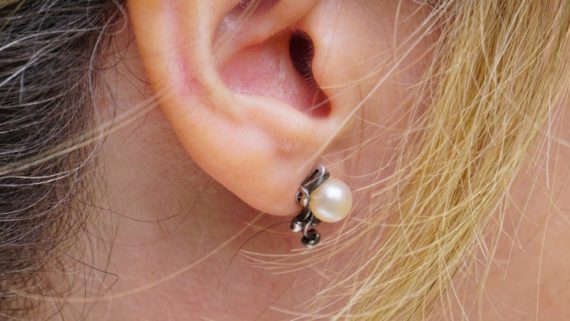So what are some of the causes of ringing in ears?
Well, let’s start by asking the question “What is tinnitus”?
Tinnitus is defined as the perception of sound when there is no external source present. While most people think of tinnitus as the traditional constant ringing in ears, the noise can actually be a hiss, a buzz, a roar, a click or quite frankly any other internal sound. This noise may be continuous or it may occur intermittently. It may be pulsatile (throbbing) or constant and its pitch may be high or low. It is said that tinnitus is a condition that affects a staggering 1 in 4 North Americans.
Short-term tinnitus can leave your ears ringing for just a few seconds to several hours; we’ve all experienced short-term tinnitus at some point in our lives. A concert a rave, a cold or an infection, these would be classic examples of short-term tinnitus.
Chronic, long term tinnitus however is quite a different thing all together. Long Term, chronic tinnitus is defined as occurring for 3 months or longer; this represents 5 to 10 percent of the current U.S. population with 1 percent having severe, debilitating tinnitus.
Tinnitus is a Symptom not a disease
The reasons behind your ears ringing vary from anatomical abnormalities, disease, changes in biochemistry, injury, changes in perception/sensitivity, medication, hearing loss, stress or simple wear and tear (aging)
According to the research, a common reason for tinnitus is inner ear cell damage. Inside the inner ear tiny, delicate hairs move in relation to pressure of sound waves. These changes in pressure triggers ear cells to release an electrical signal through a nerve from your ear to your brain, this is called the auditory nerve. Your brain then perceives these signals as sound. If for whatever reason the hairs inside your inner ear are bent, broken or damaged they can send off random electrical signals to your brain, thus triggering high pitched ringing in ears.
Tinnitus is so prevalent that in the past year nearly 25 million adults experienced tinnitus for 3 months. As we age tinnitus becomes more prevalent, 12 percent of men and 14 percent of women over the age of 63 are affected by tinnitus and it is known that over 200 medications are known to cause tinnitus as one of the side effects. Approximately 16 million people seek medical attention for tinnitus annually, affecting nearly 50 million people every year.
Tinnitus is commonly found in seniors, blue-collar workers and people with certain heart problems. As mentioned above, tinnitus is not a stand-alone disease, rather a symptom of something else. For the elderly tinnitus might be the first sign of noticeable hearing loss.
Like everything else in the body, as we age we are more susceptible to wear and tear and our hearing isn’t exempt from this.
Other ear ringing causes, common and not so common are as follows.
Sudden exposure to loud noise such as that from a firearm or a constant exposure to a loud noise, such as that from loud mechanical equipment, can cause irreversible damage. Portable music devices can also cause noise-related hearing loss. Ringing in the ears caused by exposure to loud music concerts usually goes away within a day or so, however long-term exposure to loud music or sounds can cause permanent damage, so air on the side of caution and protect your hearing at all times!
Blockages can also cause problems that lead to ears ringing;
this is most commonly seen in the form of earwax. Earwax protects your ear canal by trapping dirt and slowing the growth of bacteria. Sometimes too much earwax can accumulate and it can become impacted. This in turn can cause hearing loss or irritation, which can be one of the causes of ringing in ears.
Anatomical changes
in the middle ear from stiffening of the bones or inflammation due to injury, allergy, lifestyle or medication can affect your hearing and cause tinnitus.
There are well over 200 different medications that are currently known to cause high pitch ringing in ears. A few examples are:
- Aspirin, ibuprofen and naproxen
- Some blood pressure and heart medicines
- Some antidepressants
- Some cancer medicines
- Talk to your doctor if you think this might be a cause of your tinnitus.
After periods of acute stress tinnitus has been known to surface. Stress is of course a subjective condition that affects different people in different ways. Stress can range from environmental and psychological to physiological, perhaps in the form of an unhealthy lifestyle. However sometimes it can be a result of a combination of all of the above.
Which can quite often lead to what is called “burn out”.
In rare conditions, tinnitus can accompany such conditions as Meniere’s disease, head, face, neck injuries, TMJ
acoustic neuroma
or blood vessel disorders but these are rare and need to be addressed by a medical professional.
Regardless of the causes of ringing in ears the fact remains, you have tinnitus and it can be emotionally traumatic, stressful and depressing. It might seem as if there is no hope in sight and I have no doubt you’ve been told that there is simply nothing you can do about.
Well, let’s not end on a negative note, there is a solution to constant ringing in ears and it’s not in the form of drugs, surgery, expensive therapy or a quaky fast, detox or cleanse. The answer might be staring you right in the face, that answer might just be you!
Once you’ve visited your GP and ruled out anything potentially serious, it’s time to face facts, that I have ringing in my ears! The good news is, that regardless of how you developed your tinnitus, the solution is all the same. However, a word of warning! Please approach with extreme caution anyone who tells you that there is a “quick fix”, easy cure for tinnitus! I hate to burst your bubble, but it simply is not true. If it were the case there wouldn’t be 500 million plus people suffering from this condition and the pharmaceutical companies would already be having a field day selling you their cure!
But alas, this simply isn’t the case and there are a lot of scrupulous or misinformed individuals out there who will try to sell you a “Quick fix cure for tinnitus.” I’m not here to tell you what’s good and what isn’t, and I’m certainly not here to run down anyone’s product or potential “Cure” for tinnitus. I’m just saying if it sounds too good to be true, well, you know how the rest of the saying goes.
For me, the ringing in my ears didn’t dissipate until
I’d learnt three very important steps and answered some very powerful questions. Tinnitus can be overcome and the solution isn’t too far away.
TRS can give you the blue print towards tinnitus eradication, proven tools for gradually decreasing debilitating tinnitus, but as with anything in life, success doesn’t come over night, you have to put in the effort! TRS will guide you, but the rest is up to you! Before you continue ask yourself, “Are you done with tinnitus, are you ready?”
To find out more about this powerful, proven, unique habituation system known as TRS? Visit www.tinnitusretrain.com






